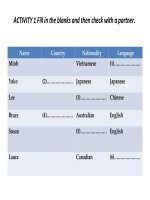grammar
Bạn đang xem bản rút gọn của tài liệu. Xem và tải ngay bản đầy đủ của tài liệu tại đây (61.77 KB, 7 trang )
<span class='text_page_counter'>(1)</span><div class='page_container' data-page=1>
15.2 The past perfect
<b>ANTE TODO</b>
<b><sub>The past perfect indicative (el pretérito pluscuamperfecto </sub></b>
<i><b>de indicativo) is used to talk about what someone had </b></i>
<i>done or what had occurred before another past action, </i>
event, or state.
<sub>Like the present perfect, the past perfect uses a form of </sub>
</div>
<span class='text_page_counter'>(2)</span><div class='page_container' data-page=2>
15.2 The past perfect
<b>cerrar </b>
<b>perder </b>
<b>asistir </b>
yo <b>había cerrado </b> <b>había perdido </b> <b>había asistido </b>
tú <b>habías cerrado habías perdido </b> <b>habías asistido </b>
Ud. / él / ella <b>había cerrado </b> <b>había perdido </b> <b>había asistido </b>
</div>
<span class='text_page_counter'>(3)</span><div class='page_container' data-page=3>
15.2 The past perfect
<b>cerrar </b>
<b>perder </b>
<b>asistir </b>
nosotros/as <b>habíamos cerrado habíamos perdido habíamos asistido</b>
vosotros/as <b>habíais cerrado </b> <b>habíais perdido </b> <b>habíais asistido </b>
Uds. / ellos / ellas <b>habían cerrado </b> <b>habían perdido </b> <b>habían asistido </b>
</div>
<span class='text_page_counter'>(4)</span><div class='page_container' data-page=4>
15.2 The past perfect
<sub>For example:</sub>
<b>Antes de 2003, había vivido en La Paz.</b>
<i>Before 2003, I had lived in La Paz.</i>
<b>Cuando llegamos, Luis ya había salido.</b>
</div>
<span class='text_page_counter'>(5)</span><div class='page_container' data-page=5>
15.2 The past perfect
<i><b><sub>The past perfect is often used with the word ya (already) </sub></b></i>
to indicate that an action, event, or state had already
occurred before another.
<b><sub>Remember that, unlike its English equivalent, ya cannot </sub></b>
<b>be placed between haber and the past participle.</b>
<b>Ella ya había salido cuando llamaron. </b>
<i>She had already left when they called.</i>
<b>Cuando lleg, Rẳl ya se había acostado.</b>
</div>
<span class='text_page_counter'>(6)</span><div class='page_container' data-page=6>
15.2 The past perfect
<b>¡ATENCIÓN!</b>
<b><sub>The past perfect is often used in conjunction with antes de </sub></b>
<i><b>+ [noun] or antes de + [infinitive] to describe when the </b></i>
action(s) occurred.
<b>Antes de este o, nunca había estudiado espol.</b>
<i>Before this year, I had never studied Spanish.</i>
<b>Luis me había llamado antes de venir.</b>
</div>
<span class='text_page_counter'>(7)</span><div class='page_container' data-page=7>
15.2 The past perfect
<b>¡INTÉNTALO! </b>
Indica el pretérito pluscuamperfecto de indicativode cada verbo.
1. Nosotros ya (cenar) _______ cuando nos llamaron.
2. Antes de tomar esta clase, yo no _______ (estudiar) nunca el español.
3. Antes de ir a México, ellos nunca _______ (ir) a otro país.
4. Eduardo nunca _______ (entrenarse) tanto en invierno.
</div>
<!--links-->









